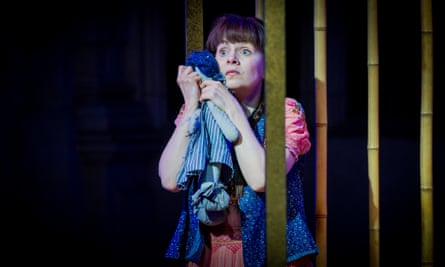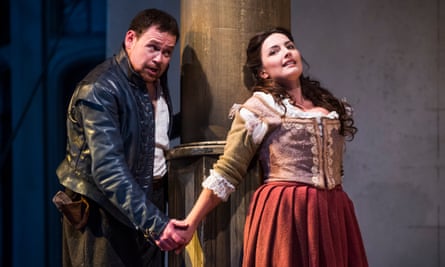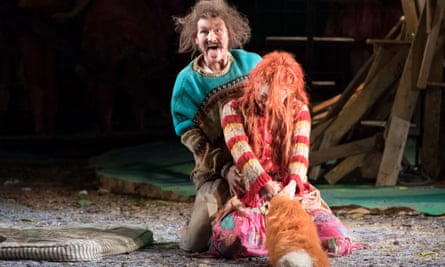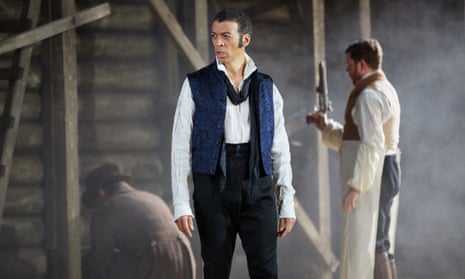For a nation that seems in permanent rehearsal for the return of Noah and his Ark it’s curious how we cling to the idea that every trip to hear opera in a sylvan setting will be a sun-kissed, bucolic delight. So far, this year’s country house opera season has been positively monsoon-like, with only occasional evenings warm enough to qualify for that longed-for combination of great music and great weather.
But when the sun does have the decency to show its face it makes a glorious addition to Garsington’s excellent Eugene Onegin – easily the best since Graham Vick’s gold-standard 1994 production for Glyndebourne. Bang on cue, early evening sunlight floods across the open-sided stage as the chorus bring home the harvest on Madame Larina’s country estate in Tchaikovsky’s most popular opera.
Baritone Roderick Williams, making his debut in the title role, gives us new insights into a man we traditionally see as a haughty, uncaring brute who breaks the heart of young Tatyana after she declares her love for him in a passionate letter. Williams lacks the vocal power of, say, Gerald Finley but more than makes up for it with his subtle psychological approach to Onegin; he’s a tortured soul, incapable of letting anyone into his life. He resents being stuck in the country with people he considers inferior and wreaks revenge by impetuously flirting with his best friend’s fiancee, Olga – with disastrous results.

Michael Boyd’s clear-sighted and intelligent direction makes full use of Williams’s agile stagecraft – including a terrific moment of suspense, which I won’t spoil here. Tenor Oleksiy Palchykov is a limpid Lensky, brave enough to set aside bravura and sing his set piece arias with quietly intense inner emotion. Jurgita Adamonyté is a charmingly vivacious Olga and the always reliable Brindley Sherratt an imposing Prince Gremin, but the evening belongs to Welsh-born Natalya Romaniw, who sings Tatyana with a mesmerising combination of grace and steely inner strength. It’s a terrific performance, which bodes well for her appearance as Lisa in Tchaikovsky’s Queen of Spades at Opera Holland Park in August.
OHP admirably revives neglected work alongside the mainstream repertoire, but this season’s rarity, Mascagni’s Iris, is so unrelentingly grim that continued neglect might have been kinder. Nevertheless, we have to recognise that its themes of abduction, subjugation and prostitution make it as depressingly relevant today as it was when first seen in 1898.
Iris, a Japanese girl so young and innocent she still clutches a rag doll, is spied by the lustful Osaka who has her kidnapped and taken to a brothel where he plots to seduce her. When she resists she is put on display for a lustful crowd of punters and then cast out. Not one male character in the whole piece has any redeeming feature; the brothel owner beats his geishas; his customers leer and jeer; the girl’s blind father, distraught at her abduction, disowns her when she is found in the red light district. Horribly mistreated, she stabs herself and dies a lingering death, dumped in a sewer.

It’s a repellent piece and musically undistinguished, but this production did at least have Anne Sophie Duprels in the title role, a rare singer capable of portraying the naivety and freshness of youth while singing with blazing maturity. The wildness in Noah Stewart’s tenor needs urgent attention, but here proved curiously useful in his portrayal of the creep Osaka. Olivia Fuchs’s direction made imaginative use of Soutra Gilmour’s attractive design and the City of London Sinfonia played with admirable commitment under Stuart Stratford – but it cannot be described as a fun night out.
More successful is OHP’s La Bohème – even if it is dizzying to find Puccini’s fin de siècle Paris translated to Shakespeare’s London. The hero Rodolfo, thrillingly sung by Shaun Dixon, even looks like the bard as he sits penning his poetry on a set that designer Andrew D Edwards has made to resemble the Globe’s Elizabethan stage. It’s a tongue-in cheek addition to the 400th anniversary celebrations which, in the first two acts at least, does not take itself too seriously. Elin Pritchard does a delicious turn as the impossible Musetta in the Cafe Momus scene, which fizzes and bubbles under Stephen Barlow’s intricate direction, and Anna Patalong makes a markedly coquettish, vocally rich Mimi. The whole thing rattles along under the brisk conducting of Matthew Waldren, who draws some fine playing from the CLS, particularly in the heartbreaking closing pages.

Meanwhile, down in deepest Sussex all creatures great and small are hopping, jumping, flying and slithering about in Glyndebourne’s cracking revival of Melly Still’s slick production of The Cunning Little Vixen, conducted by Jakub Hrůša. The figure of a strong, independent woman – central to virtually all Janáček operas – is embodied here in wily Vixen Sharp Ears, given irresistible energy by soprano Elena Tsallagova. She won’t take nonsense from any man, not least her tormentor the Forester – Christopher Purves, who in his closing hymn to nature, secures his position as one of our finest British baritones.
Tom Pye’s picture-book set and Dinah Collin’s ingenious costumes are bathed in Paule Constable’s gloriously warm, sunny lighting. If only she could conjure something similar outside…
Star ratings (out of five):
Eugene Onegin ★★★★★
Iris ★★★
La Bohème ★★★★
The Cunning Little Vixen ★★★★

Comments (…)
Sign in or create your Guardian account to join the discussion